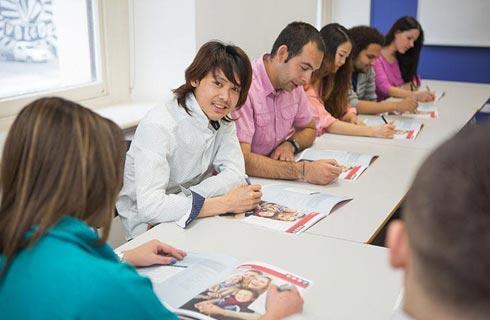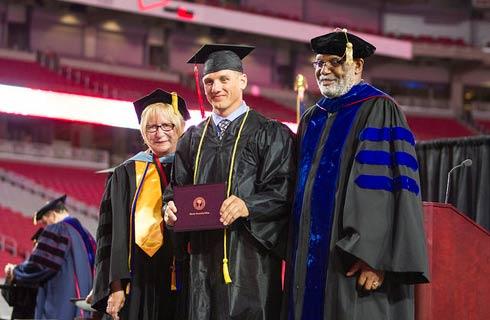- IDP China>
- 课程库>
- 计算机科学>
- 计算机与信息科学>
- 计算机与信息科学概述>
- Doctor of Philosophy in Informatics - Intelligent and Interactive Systems
信息学哲学博士-智能交互系统
Doctor of Philosophy in Informatics - Intelligent and Interactive Systems

学历文凭
Ph.D.

专业院系
Department of Informatics

开学时间

课程时长

课程学费

国际学生入学条件
Three- or four-year bachelor's degree. Scan and upload copies of your transcript(s), mark sheet(s) and degree certification(s)Applicants should have a minimum of a 3.0 (B) or higher GPA. Many doctoral applicants have a GPA of 3.5 (B+) or above.three (3) letters of recommendation
IDP—雅思考试联合主办方

雅思考试总分
7.0
- 雅思总分:7
- 托福网考总分:100
- 托福笔试总分:160
- 其他语言考试:120 or above for Duolingo
CRICOS代码:
申请截止日期: 请与IDP联系 以获取详细信息。
课程简介
智能和交互式系统(IIS)是一个跨学科领域,研究人类与数字技术之间的相互作用,并开发可以与人类及其环境相互作用的智能技术。该领域的研究和教学包括人工智能,计算机视觉,人机交互,动力学系统和认知科学等。博士学位的智能和交互式系统(IIS)轨道。信息学专业的学生将通过与其他学术机构,研究中心和企业的研究合作,为学生成为这一跨学科知识领域的顶尖学术研究人员和实践人员做好准备。我们的老师也很乐意指导攻读博士学位的学生。希望在计算机视觉,社交机器人和/或人机交互等领域进行研究的计算机科学专业的博士。
Intelligent and Interactive Systems (IIS) is an interdisciplinary field that studies the interactions between humans and digital technologies, and develops intelligent technologies that can interact with humans and their environment. Research and teaching in the field include artificial intelligence, music informatics, computer vision, human-robot interaction, dynamical systems, and cognitive science, among others. Students and faculty explore theories, develop prototype technologies, as well as evaluating interactions between humans and these technologies. Intelligent and interactive technologies are becoming an increasingly important part of people's daily lives. For instance, robots cooperate with humans, enabling them to perform common tasks, while pervasive wearable devices monitor our health habits and daily activities, and cloud-based systems seek to identify the sights and sounds of our surroundings. Investigating and building these technologies involves both understanding the relationship between people and computing systems, as well as technological advances in making computers better able to understand, perceive, and interact with their environment. The Intelligent and Interactive Systems track in Informatics is a multidisciplinary program that approaches information and communication technology from both technological and human perspectives. Graduate students will have the opportunity to explore a diverse range of research topics, including autonomous robots, computer vision, music informatics, culturally-situated technology design, dynamical systems, human-robot interaction, object and activity recognition, social robotics, video and image understanding, and wearable and ubiquitous computing.
Intelligent and Interactive Systems (IIS) is an interdisciplinary field that studies the interactions between humans and digital technologies, and develops intelligent technologies that can interact with humans and their environment. Research and teaching in the field include artificial intelligence, music informatics, computer vision, human-robot interaction, dynamical systems, and cognitive science, among others. Students and faculty explore theories, develop prototype technologies, as well as evaluating interactions between humans and these technologies. Intelligent and interactive technologies are becoming an increasingly important part of people's daily lives. For instance, robots cooperate with humans, enabling them to perform common tasks, while pervasive wearable devices monitor our health habits and daily activities, and cloud-based systems seek to identify the sights and sounds of our surroundings. Investigating and building these technologies involves both understanding the relationship between people and computing systems, as well as technological advances in making computers better able to understand, perceive, and interact with their environment. The Intelligent and Interactive Systems track in Informatics is a multidisciplinary program that approaches information and communication technology from both technological and human perspectives. Graduate students will have the opportunity to explore a diverse range of research topics, including autonomous robots, computer vision, music informatics, culturally-situated technology design, dynamical systems, human-robot interaction, object and activity recognition, social robotics, video and image understanding, and wearable and ubiquitous computing.
相关申请
 预科
预科 奖学金
奖学金 实习机会
实习机会 在校学习
在校学习 跨境学习
跨境学习 校园授课-线上开始
校园授课-线上开始 在线/远程学习
在线/远程学习
开学时间&学费
学费信息仅供参考,请与IDP联系以获取详细信息
| 开学时间 | 时长 | 学费 | 地点 |
|---|
学校排名

世界排名134
数据源:
泰晤士高等教育世界大学排名
本校相关课程

视觉科学哲学博士
学历文凭
Ph.D.
开学日期
课程费用总额


听力学博士
学历文凭
Ph.D.
开学日期
课程费用总额


语言与听力科学哲学博士
学历文凭
Ph.D.
开学日期
课程费用总额


第二语言研究哲学博士
学历文凭
Ph.D.
开学日期
课程费用总额


宗教学哲学博士
学历文凭
Ph.D.
开学日期
课程费用总额


西班牙语言学哲学博士
学历文凭
Ph.D.
开学日期
课程费用总额

其他相关课程

计算机科学学士-信息系统(荣誉学位)
 康考迪亚大学
康考迪亚大学学历文凭
Bachelor Degree with Honours
开学日期
课程费用总额


信息哲学博士
 多伦多大学
多伦多大学学历文凭
Ph.D.
开学日期
课程费用总额


信息硕士
 多伦多大学
多伦多大学学历文凭
Masters Degree
开学日期
课程费用总额


应用信息技术证书
 温莎大学
温莎大学学历文凭
Bachelor Degree
开学日期
课程费用总额


计算机科学学士-信息系统
 康考迪亚大学
康考迪亚大学学历文凭
Bachelor Degree
开学日期
课程费用总额


乔治布朗学院区块链开发证书
 乔治布朗学院
乔治布朗学院学历文凭
Graduate Certificate
开学日期
课程费用总额










 美国
美国
